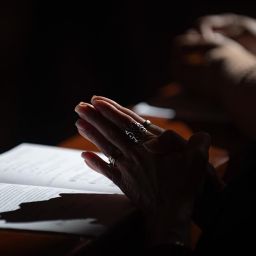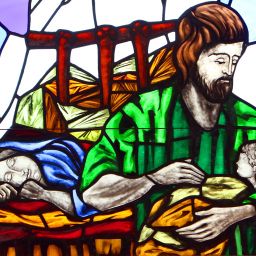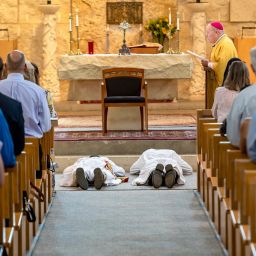
By Father John Bayer
Special to The Texas Catholic
This Lent I’m studying the “wilderness” or “desert” in Scripture, and especially in the journey of Israel from Egypt to the Promised Land. The dangerous wild is a powerful image for the spiritual life, and it plays a large part in the lives of figures like Jacob, Moses, David, Elijah, John the Baptist and Jesus. What about in yours?
God wants to lead us into the wilderness. Why? After rescuing the Israelites from Egypt, God does not take them directly to the Promised Land. He leads them along a circuitous route through the desert, because he knows that the prospect of fighting the Philistines — whom Israel would have to encounter if they took a direct route — would frighten them so much they would turn back to Egypt (Ex 13:17). God will eventually lead Israel into battle, but first he wants to prepare them. Whenever we find ourselves in a spiritual desert, we should try to understand our interior struggles as so many ways for God to prepare us for our mission in the world.
In the wilderness Israel struggles in all sorts of ways: initially, they fear the persecution of Egypt, their former tyrant (Ex 14:11-14); then they fear dying of thirst (Ex 15:22) and hunger (Ex 16:3); they fear God has left them (Ex 32:1); and they fear that the task God has given them — conquering the Promised Land — is too hard (Nm 14:1-4). In all their complaints, they experience the temptation to return to their enslavement. Rather than learn to rely on God to meet their needs in the wilderness, they prefer the controlled security of their old life in Egypt. Sure, they might have suffered terribly under their tyrants, but at least they could guarantee for themselves that they would have food and drink. As pilgrims we can be tempted to do the same: when we are impatient for healing, or afraid to suffer trials in the struggle for holiness, we can doubt the goodness of God and the beauty of his call, and thereby justify our collapse back into old habits that we know lead to sadness and death, even if in the meantime they seem to offer some fleeting consolation.
Again, the wilderness is a place to be tested and thereby strengthened, to be made ready for the mission God has in mind for each of us. He is, therefore, very deliberate about what specific struggles he allows to befall Israel and about how exactly he will relieve their burden. Take the problem of hunger, for example. In response to their hunger, God promises to give them bread from heaven. But he commands them to collect only enough “manna” for each day, and thus to trust that more manna will be given them on the next day. This was “to test them … to see whether they will follow my law or not” (16:4). God was not interested in testing their ability to ration; he wanted to test their trust. Will Israel learn to rely upon the provisions of her Provident Father, or will she despair of his goodness and obsess about how to secure her own future?
During the fervor of our first conversion – our rescue from Egypt — we can be awestruck by the goodness of God. But God knows our hearts (Jer 17:9-10; Jn 2:24) and how easily our fervor can attach to the gifts we receive rather than their Giver. And so, he invites us into the wilderness, where we can learn to cling to Him, to cherish being with him no matter the circumstances, loving him like a faithful friend who accompanies us through thick and thin, rather than like a Santa Claus who only ensures we are always ‘thick’ with stuff. In the desert, Israel is learning to value the presence of God above any of his many gifts to them (cf. Ex 33-34). As Jesus told his disciples after having given them the marvelous gift of casting out demons, “[D]o not rejoice because the spirits are subject to you, but rejoice because your names are written in heaven” (Lk 10:20).
In the wilderness with God, we know that we have been rescued from slavery to sin, and that we are constantly still being rescued again. We see how different we are from others because he has chosen us to rely upon him for a special mission. “You have yourselves seen what I did with the Egyptians, how I carried you on eagle’s wings and brought you to myself. From this you know that now, if you obey my voice and hold fast to my covenant, you of all the nations shall be my very own for all the earth is mine” (Ex 19:3-5, cf. Dt 7: 6-9). Whenever we sin and fail to trust him as our most intimate friend, God promises to lead us back into the wilderness to teach us again about his love: “I will allure her, and bring her into the wilderness and speak tenderly to her. […] And in that day, says the Lord, you will call me, ‘My husband’” (Hosea 2:14-16).
God wants to strengthen us, to make known to us his personal love for us. That is why we struggle in the wilderness. Struggle well.
Father John Bayer, O. Cist., is a monk at the Cistercian Abbey of Our Lady of Dallas in Irving.















